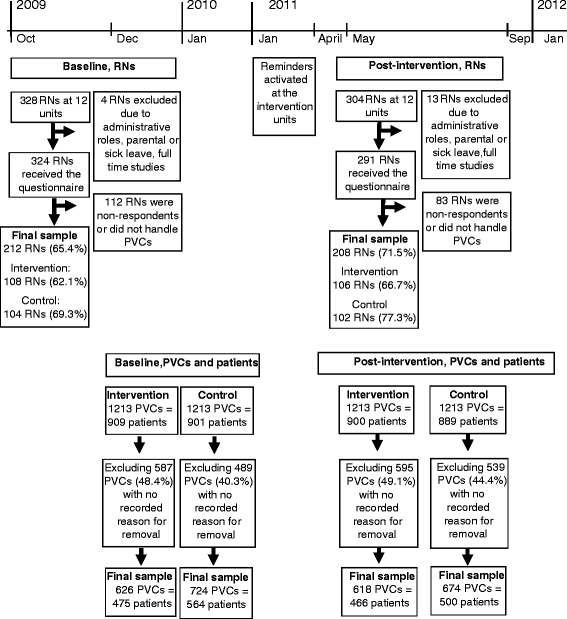Effects of computer reminders on complications of peripheral venous catheters and nurses' adherence to a guideline in paediatric care--a cluster randomised study
- PMID: 26818599
- PMCID: PMC4728777
- DOI: 10.1186/s13012-016-0375-9
Effects of computer reminders on complications of peripheral venous catheters and nurses' adherence to a guideline in paediatric care--a cluster randomised study
Abstract
Background: Reminder systems in electronic patient records (EPR) have proven to affect both health care professionals' behaviour and patient outcomes. The aim of this cluster randomised trial was to investigate the effects of implementing a clinical practice guideline (CPG) for peripheral venous catheters (PVCs) in paediatric care in the format of reminders integrated in the EPRs, on PVC-related complications, and on registered nurses' (RNs') self-reported adherence to the guideline. An additional aim was to study the relationship between contextual factors and the outcomes of the intervention.
Methods: The study involved 12 inpatient units at a paediatric university hospital. The reminders included choice of PVC, hygiene, maintenance, and daily inspection of PVC site. Primary outcome was documented signs and symptoms of PVC-related complications at removal, retrieved from the EPR. Secondary outcome was RNs' adherence to a PVC guideline, collected through a questionnaire that also included RNs' perceived work context, as measured by the Alberta Context Tool. Units were allocated into two strata, based on occurrence of PVCs. A blinded simple draw of lots from each stratum randomised six units to the control and intervention groups, respectively. Units were not blinded. The intervention group included 626 PVCs at baseline and 618 post-intervention and the control group 724 PVCs at baseline and 674 post-intervention. RNs included at baseline were 212 (65.4 %) and 208 (71.5 %) post-intervention.
Results: No significant effect was found for the computer reminders on PVC-related complications nor on RNs' adherence to the guideline recommendations. The complication rate at baseline and post-intervention was 40.6 % (95 % confidence interval (CI) 36.7-44.5) and 41.9 % (95 % CI 38.0-45.8), for the intervention group and 40.3 % (95 % CI 36.8-44.0) and 46.9 % (95 % CI 43.1-50.7) for the control. In general, RNs' self-rated work context varied from moderately low to moderately high, indicating that conditions for a successful implementation to occur were less optimal.
Conclusions: The reminders might have benefitted from being accompanied by a tailored intervention that targeted specific barriers, such as the low frequency of recorded reasons for removal, the low adherence to daily inspection of PVC sites, and the lack of regular feedback to the RNs.
Trial registration: Current Controlled Trials ISRCTN44819426.
Figures
References
-
- Gabbay J, Le May A. Evidence based guidelines or collectively constructed “mindlines?” Ethnographic study of knowledge management in primary care. British Medical Journal. 2004; doi: http://dx.doi.org/10.1136/bmj.329.7473.1013 - PMC - PubMed
Publication types
MeSH terms
Associated data
LinkOut - more resources
Full Text Sources
Other Literature Sources
Miscellaneous


